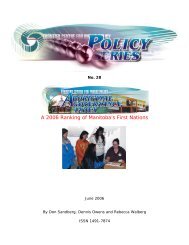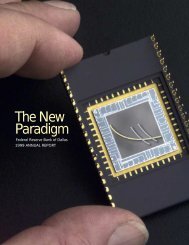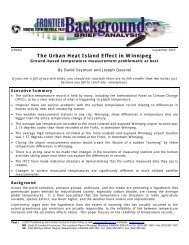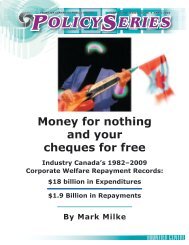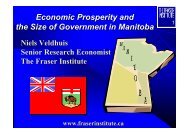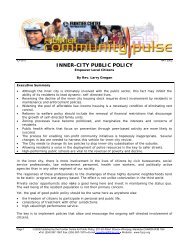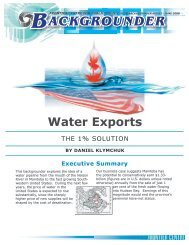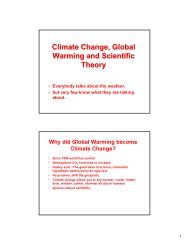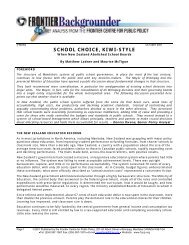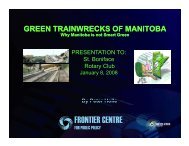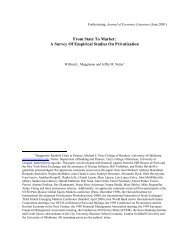The New Paradigm - Federal Reserve Bank of Dallas
You also want an ePaper? Increase the reach of your titles
YUMPU automatically turns print PDFs into web optimized ePapers that Google loves.
23<br />
versatile, far-reaching asset—brainpower. Our inventory <strong>of</strong><br />
science and technology—the raw material <strong>of</strong> new products<br />
and processes—exceeds anything seen before.<br />
Global positioning satellites, artificial intelligence and<br />
virtual reality are only now emerging as sources <strong>of</strong> new<br />
goods and services. Biotechnology, too, is still in its infancy.<br />
Armed with the tools <strong>of</strong> computational biology, scientists<br />
will soon complete the Human Genome Project, an effort<br />
to identify our entire genetic code. <strong>The</strong> research could<br />
make possible treatments for a host <strong>of</strong> conditions—from<br />
baldness to Alzheimer’s disease. Nanotechnology, the<br />
emerging science <strong>of</strong> molding matter at the molecular level,<br />
promises materials that conduct electric pulses with only<br />
minute resistance and machines the size <strong>of</strong> microbes to<br />
attack viral diseases.<br />
Science gives us new technologies, but entrepreneurs<br />
forge new products and organize new industries. From<br />
Thomas Edison to Bill Gates, the great architects <strong>of</strong> enterprise<br />
stand as symbols <strong>of</strong> the legions who turn technology<br />
into pr<strong>of</strong>its. Capitalism’s competition is a race, with the<br />
prize going to those who harness technology to deliver<br />
newer, better and cheaper products. <strong>The</strong> new paradigm<br />
rises out <strong>of</strong> a powerful mix—a dynamic market economy<br />
percolating with technology.<br />
<strong>The</strong> <strong>New</strong> Economy manifests America’s future, but<br />
making the most <strong>of</strong> it requires new thinking. We can no<br />
longer operate under the old assumptions about how fast<br />
the economy can grow, how low unemployment can go<br />
and when policymakers should apply the brakes to ward<br />
<strong>of</strong>f inflation. Judging from the 1990s, the upper limit for<br />
noninflationary growth may be a full point or more higher<br />
than most economists thought at the start <strong>of</strong> the decade.<br />
Faster growth and low inflation do go together, not just<br />
in the short run but in the long term as well. In fact, we’ve<br />
arrived at lower inflation not despite faster growth but<br />
because <strong>of</strong> it. <strong>The</strong> <strong>New</strong> Economy needs to expand to capture<br />
the benefits <strong>of</strong> declining long-run average costs. We<br />
shouldn’t underestimate the microprocessor technology’s<br />
ability to make us more productive. If industries and workers<br />
continue to leap in efficiency, pressure to raise prices<br />
won’t be as great.<br />
By itself, growth is no longer an automatic trigger for<br />
inflation. We cannot assume that strong GDP or vigorous<br />
By allowing us to replicate the power <strong>of</strong> the human brain and put it<br />
wherever we want, the microchip launched a new economic paradigm<br />
that is transforming virtually every aspect <strong>of</strong> the world around us. Applications<br />
for the chip’s “canned brainpower” are limited only by our imagination.<br />
demand makes a spike in prices inevitable. As we advance<br />
into the <strong>New</strong> Economy, the best course is to keep the<br />
emphasis on direct measures <strong>of</strong> the price level. After all,<br />
the best place to look for inflation is in price statistics, not<br />
in readings <strong>of</strong> economic activity levels.<br />
High inflation is undeniably a curse. Rapidly rising<br />
prices rob consumers <strong>of</strong> their hard work and savings.<br />
Uncertainty about future costs is unsettling for both individuals<br />
and companies. Most important, too-high inflation<br />
always leads to a day <strong>of</strong> reckoning, when the economy<br />
must be throttled back to restore stable prices. <strong>The</strong> worse<br />
the inflation, the tighter the screws must be turned.<br />
It’s right to be vigilant about inflation. Even so, we cannot<br />
ignore the changes sweeping the nation and world.<br />
<strong>The</strong> new economic paradigm has brought us the best <strong>of</strong> all<br />
worlds—innovative products, new jobs, high pr<strong>of</strong>its, soaring<br />
stocks. And low inflation.<br />
It’s wise to be wary <strong>of</strong> inflation—but also to give growth<br />
a chance.<br />
—W. Michael Cox and Richard Alm<br />
<strong>Federal</strong> <strong>Reserve</strong> <strong>Bank</strong> <strong>of</strong> <strong>Dallas</strong> 1999 ANNUAL REPORT




